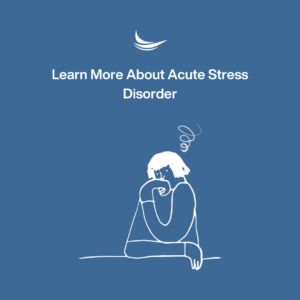Learn More About Acute Stress Disorder
 What is Acute Stress Disorder?
What is Acute Stress Disorder?
The National Center for PTSD describes acute stress disorder as a mental health problem that can occur in the first month after a traumatic event.
What are the Symptoms of Acute Stress Disorder?
Symptoms of acute stress disorder include:
Dissociative symptoms (3+ of the following):
- Numbing, detachment, or being emotionally unresponsive
- Reduced awareness of your surroundings
- Derealization (sense of your environment as strange or unreal to you)
- Depersonalization (feeling as if your thoughts or emotions don’t seem real)
- Dissociative amnesia (inability to remember important aspects of the traumatic event
Reexperiencing the traumatic event (1+ of the following):
- Recurring images, thoughts, nightmares, illusions, or flashback episodes of the traumatic event
- Feeling as if you’re reliving the traumatic event
- Feeling distressed when something reminds you of the traumatic event
Avoidance of things such as thoughts, feelings, conversations, activities, places, and people that are reminders of the trauma.
Anxiety or increased arousal such as having difficulty sleeping, being irritable, difficulty concentrating, restlessness, being on guard/ on “high alert”, and being easily startled.
Is Acute Stress Disorder the Same as Post-traumatic Stress Disorder?
No, while symptoms of acute stress are like those of post-traumatic stress, symptoms need to be present for longer than one month for post-traumatic stress disorder. The symptoms of PTSD have similar but different categories which include intrusion/ re-experiencing symptoms, avoidance, negative alterations in cognition and mood, and increased arousal and reactivity. PTSD can be chronic and may persist for years for some people; whereas, acute stress disorder lasts up to 4-weeks.
If I am Experiencing Symptoms of Acute Stress, Will I Have PTSD?
Not necessarily. A mental health professional can help assess if you meet the full diagnostic criteria for acute stress disorder. Those who meet the criteria for ASD do have a high likelihood of developing PTSD (over 80%).
Who is impacted by Acute Stress Disorder?
Anyone who has experienced a traumatic event is at risk of experiencing acute stress disorder, including children.
How Common is Acute Stress Disorder?
While the rate of developing acute stress disorder varies for different types of trauma, studies range from 6% to 33%. Survivors of violent acts show rates at the higher end.
Is Acute Stress the Same as an Adjustment Disorder?
While acute stress disorder is in the same diagnostic category as adjustment disorders, they are different. An adjustment disorder develops after a stressful situation such as losing a job; whereas, an acute stress disorder develops after a traumatic event such as an aggravated robbery, sexual assault, or mass shooting.
Are there Effective Treatments for Acute Stress Disorder?
Yes! Psychotherapy (talk therapy) is the primary recommended treatment. Your therapist will complete a mental health assessment and develop a treatment plan to help provide relief from distress. Interventions may include but are not limited to mind-body interventions, trauma-focused cognitive behavioral therapy, symptom management, narrative interventions, exposure work, and relaxation strategies.
Written By: Charlotte Johnson, MA, LPCC



























